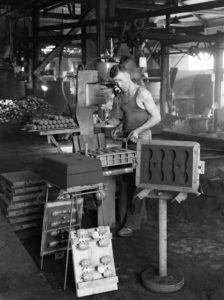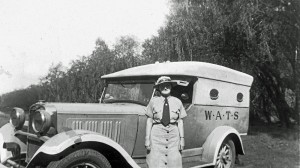During World War 1 and 2 Ipswich became an active community that contributed to the home front effort through patriotic societies and the supplying of employees to manufacture munitions and other important consumables for the war effort.
Patriotism in Ipswich
World War 1 and 2 brought about the birth of many patriotic societies, whose intention was to provide Australian and British soldiers with much needed support while they were serving their country. The Red Cross was extremely influential in this area with many special events and drives being set up by the organisation to make bandages, clothes, and knitted socks for soldiers on the front-line. In World War 1 after news was heard in Ipswich of a shortage of sandbags on the front a sandbag league was established to raise money and materials to make and buy bags. An Ipswich Train Tea Society was also established by the women of Ipswich, and involved the serving of refreshments to soldiers on troop trains passing through the town. Christmas time was also a memorable time of year for soldiers on the front with many Ipswich residents sending rare treats and gifts such as cigarettes and cakes over to the troops. Patriotic parades, balls and community and business funds were also ongoing during World War 1 and 2.
Manufacturing during the Wars
During World War 1 and 2 Ipswich was a hub of manufacturing activity as many local Ipswich businesses were transformed into manufacturers of munitions, and other goods for the war effort. The Railway Workshops played a major part in the production of these materials during both the first and second world wars, with selected staff being employed by the war effort to produce munitions such as shells and bullets. During World War 2 the Railway Workshops were called on to produce a wide array of munitions equipment, which included items such as gun barrels, tools and some aircraft parts.
Scott’s Foundry, a local Ipswich company, also played an important part in the war effort with the factory and its workers being employed to produce munitions such as hand grenades. The Queensland Woollen Manufacturing Company staff also played their part by assisting in in the production of woollen blankets and khaki material for soldiers.

Making hand grenades at Scott’s Foundry, Wharf Street Ipswich, 1940-1944 – Image courtesy of Picture Ipswich
The Community on the home front
The home front during World War 1 and 2 in Ipswich was a difficult place to be but residents made the best of a trying situation. Ipswich was a hub of activity for the war effort with Redbank Army Camp being established to house 2500 new troops. This camp was used to teach new recruits the basics of soldiering including marching and saluting. The camp was well equipped with numerous huts, a mess hall and a canteen, and was located in a large area on the Brisbane River, near the Redbank Woollen Mills. As well as a recruiting camp Ipswich also provided space in the showgrounds for a Casualty Clearing Station. The main building of the showground was used to house recruits recovering from surgery, while other services such as x-rays and operations were carried out at the Sandy Gallop Asylum. A number of local specialists from Ipswich and Brisbane offered their skills in this field hospital.
During World War 2 the threat of war became all the more prevalent in Ipswich and as such services such as First Aid Posts and volunteer fire fighting teams were established. Later a blackout was declared and residents were required to cover windows and lights to prevent the enemy from seeing the town from the air. Men who were left on the home front were also committed to doing their bit for the troops, with a Volunteer Defence Corps being established. The women of Ipswich during this time worked mightily to maintain their community and support their husbands, children, siblings and parents who were on the front by manning various First Aid Posts around the town, staffing canteens and establishing a Women’s Auxiliary Transport Service which was care of the Australian Women’s Land Army.

Van used by the Women’s Auxiliary Transport Service, Ipswich 1942 – Image courtesy of Picture Ipswich
Rationing was also a major part of World War 1 and 2 with the town of Ipswich facing strict rationing for petrol, tea, cigarettes, alcohol, butter, clothing and other foodstuffs. In order to monitor a family’s intake a limited amount of ration booklets and coupons for food, clothing and petrol were divided up between people and families. During the early rationing period in Ipswich there was, according to reports, rarely a shortage of meat in the area due to the large number of local producers, however rationing was soon increased due to a higher demand for meat in the UK.
In order to establish that each resident received their allotted amount of coupons, they were required to present ID tags when collecting their ration booklets at the local post office. A slightly different approach was taken for clothing coupons which could be collected from selected establishments including schools and family homes. Due to rationing many things became hard to come by including fashionable women’s clothing, therefore many Ipswich families made the most of the supplies they had by saving flour bags and old sheets and towels to make dresses and under garments and butchers twine for crochet. The war years were hard times but Ipswich was a community who rallied together to support their country on the front line.
For more information on Queensland and the Home-Front war effort visit the Queensland State Archives website.
Information taken from: ‘Rationing on the Ipswich Home-Front’ by Helen McMonagle; ‘Ipswich Remembers: Military Heritage 1860s – 1990s’ by Robyn Buchanan.
